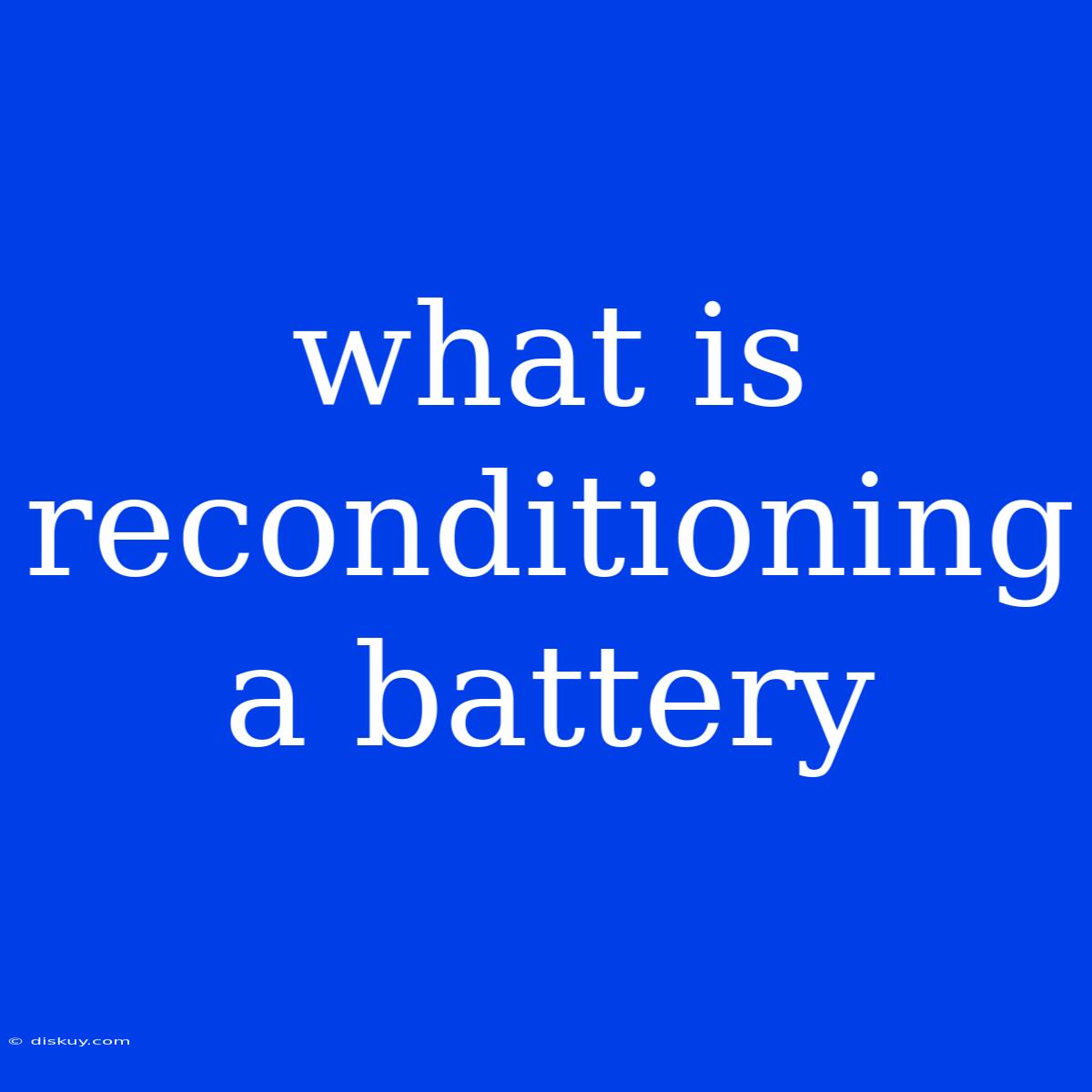What is Reconditioning a Battery?
Can a dead battery be brought back to life? Battery reconditioning is the process of restoring a battery's performance to a near-new state. It's not magic, but it can be a viable alternative to replacing a battery, especially for lead-acid batteries used in cars, motorcycles, and some power tools.
Editor Note: Battery reconditioning can be a cost-effective way to extend the life of your batteries, but it's not a guaranteed fix.
Why is this topic important?
As we become more reliant on devices powered by batteries, understanding how to extend their lifespan is critical. Battery reconditioning can help you save money and reduce e-waste.
This review will cover:
- How Battery Reconditioning Works
- The Benefits of Reconditioning
- The Risks of Reconditioning
- When Reconditioning is Not Recommended
Analysis:
To provide you with a comprehensive understanding of battery reconditioning, we've dug into the process, its benefits, and potential drawbacks. We've also consulted with experts and reviewed numerous sources to offer valuable insights that can help you make informed decisions regarding your batteries.
Key Points of Battery Reconditioning:
| Key Points | Description |
|---|---|
| Process | Involves cleaning, desulfating, and charging the battery to restore its capacity. |
| Benefits | Can extend battery life, reduce costs, and minimize environmental impact. |
| Risks | May not work for all batteries, could damage the battery, and may not provide long-term solutions. |
| Alternatives | Battery replacement, battery maintenance, and switching to alternative battery technologies. |
How Battery Reconditioning Works:
Battery reconditioning addresses the primary cause of battery degradation: sulfation.
Sulfation is the buildup of lead sulfate crystals on the battery plates. This buildup hinders the flow of electrical current, reducing the battery's capacity and performance.
The reconditioning process aims to remove these sulfate crystals, restoring the battery's ability to hold a charge.
Key Aspects of Battery Reconditioning:
Cleaning and Desulfation:
- Introduction: Cleaning and desulfation are the core components of battery reconditioning.
- Facets:
- Cleaning: The battery's terminals and casing are cleaned to improve electrical conductivity.
- Desulfation: Techniques like pulse charging or using special solutions are employed to break down sulfate crystals.
Discussion: The effectiveness of desulfation depends on the severity of sulfation and the condition of the battery.
Charging:
- Introduction: Once the battery is cleaned and desulfated, it's charged to restore its capacity.
- Facets:
- Slow Charge: A slow, controlled charge is preferred to avoid damaging the battery.
- Equalization Charge: May be used to ensure all cells in the battery have a similar charge level.
Discussion: The charging process is crucial for restoring the battery's ability to hold a charge. It's important to follow the manufacturer's recommendations for charging time and voltage.
Benefits of Reconditioning:
- Cost-Effectiveness: Reconditioning can be significantly cheaper than replacing a battery.
- Extended Lifespan: Reconditioning can extend the life of a battery by months or even years.
- Reduced Environmental Impact: Reconditioning reduces the need to dispose of old batteries, minimizing waste.
Risks of Reconditioning:
- Not All Batteries Can Be Reconditioned: Batteries that are heavily sulfated or physically damaged may not be suitable.
- Potential Battery Damage: Improper reconditioning can damage the battery, shortening its lifespan.
- Temporary Fix: Reconditioning may not provide a long-term solution, and the battery may require reconditioning again in the future.
When Reconditioning is Not Recommended:
- Damaged or Leaking Batteries: Reconditioning is not recommended for batteries with physical damage or leaks.
- Batteries with Low Capacity: Batteries that have lost a significant amount of their capacity may not be worth reconditioning.
- Batteries Over Five Years Old: Batteries over five years old are less likely to benefit from reconditioning.
FAQ:
Q: Can I recondition a battery myself? A: While DIY reconditioning kits are available, it's recommended to seek professional assistance, especially for car batteries.
Q: How often can a battery be reconditioned? A: The number of reconditioning cycles depends on the battery's condition and the quality of the process.
Q: How long does reconditioning take? A: The time for reconditioning can vary from a few hours to several days depending on the method and the battery's condition.
Q: Is battery reconditioning safe? A: Reconditioning can be safe if done properly, but there are risks involved, such as battery acid spills or electrical shocks.
Q: What are the alternatives to reconditioning?
A: If reconditioning is not an option, you can consider:
- Replacing the battery: This is the most common solution, but it can be expensive.
- Battery maintenance: Regularly checking and cleaning the battery can help extend its lifespan.
- Switching to alternative battery technologies: Li-ion batteries offer longer lifespans and lower maintenance requirements.
Tips for Battery Reconditioning:
- Choose a reputable reconditioning service: Research and choose a service with a good track record.
- Understand the limitations of reconditioning: Not all batteries can be reconditioned successfully.
- Follow the instructions carefully: Proper procedures are essential for safe and effective reconditioning.
- Maintain your battery after reconditioning: Regular maintenance can help extend the benefits of reconditioning.
Summary:
Battery reconditioning is a process that can restore a battery's performance, but it's not a guaranteed fix. It's essential to weigh the benefits and risks before deciding if reconditioning is the right choice for your battery.
Closing Message: While reconditioning can be a viable option for extending the life of your batteries, remember that it's not a magic cure-all. By understanding the process, its limitations, and the available alternatives, you can make informed decisions that maximize your battery's lifespan and minimize its environmental impact.

